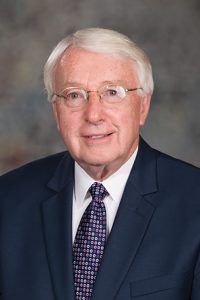Opiate education sought for health care professionals
Certain health care professionals would be required to participate in continuing education about prescribing opiates under a bill considered by the Health and Human Services Committee Jan. 18.

LB788, introduced by Ralston Sen. Merv Riepe, would require nurse midwives, nurse anesthetists, dentists, physicians, physician assistants, nurse practitioners, podiatrists and veterinarians to enroll in at least five hours of continuing education on prescribing opiates every two years. Two of the five hours would cover the state’s prescription drug monitoring program.
The requirement would begin Oct. 1, 2018.
Riepe said it is critical for patients to receive pain treatment that is effective and safe, which includes keeping medical professionals up-to-date on best practices. According to the Centers for Disease Control and Prevention, he said, the majority of drug overdose deaths in the United States are the result of opioids.
“We must do our part to respond to this national emergency as it continues to draw closer to Nebraska,” he said.
Riepe indicated that he would offer an amendment to reduce the two-hour requirement focusing on the prescription drug monitoring system to 30 minutes. The state Department of Health and Human Services has indicated that they currently have 30 minutes of material on that subject prepared, he said.
Stephen Lazoritz, chairman of the continuing medical education commission of the Nebraska Medical Association, testified in support of the bill. Continuing education is essential for medical professionals, he said, particularly in relation to opioids. While the state has done well in establishing the prescription drug monitoring program, he said, medical professionals must know how to use it effectively.
“This bill is just one piece of the puzzle,” Lazoritz said. “Anyone who writes a prescription really needs to do this.”
Dr. Edward Truemper, a pediatric intensive care specialist and medical school faculty member, also testified in support. Most medical professionals choose their own continuing education options to fill their requirements, he said, and the vast majority likely do not have a single hour of continuing education related to the prescription delivery of opiates.
“The lack of knowledge related to prescribing related to opiates is a travesty, and we are responsible for much of the problem we currently have here in the United States,” Truemper said. “We need to have this education; it needs to be mandated.”
David O’Doherty, executive director of the Nebraska Dental Association (NDA), testified in support of the bill, but expressed concerns. He said the Board of Dentistry recently recommended three hours of continuing education, one time, and the NDA supports that recommendation. In addition, he said, the bill should be limited to apply only to professionals who are licensed by the Drug Enforcement Administration (DEA) to prescribe medications.
“Fifty percent of the dentists, approximately, don’t have a DEA license so they would be forced to take education that doesn’t even apply to them and their practice,” O’Doherty said.
Speaking in opposition to the bill, Lance Roasa, testifying on behalf of the Nebraska Veterinary Medical Association (NVMA), echoed those concerns. Many veterinarians do not prescribe opioids at all, he said. In addition, he said, standards for continuing education should be developed at the state board level in order to ensure that the requirements fit the profession.
“Our profession – and the NVMA – is very much for the intent of this bill,” Roasa said. “We do know that we have an opioid crisis and we’re every bit as committed to ceasing that crisis. However, this legislation does affect a lot of veterinarians that don’t contribute to that crisis at all.”
The committee took no immediate action on the bill.

